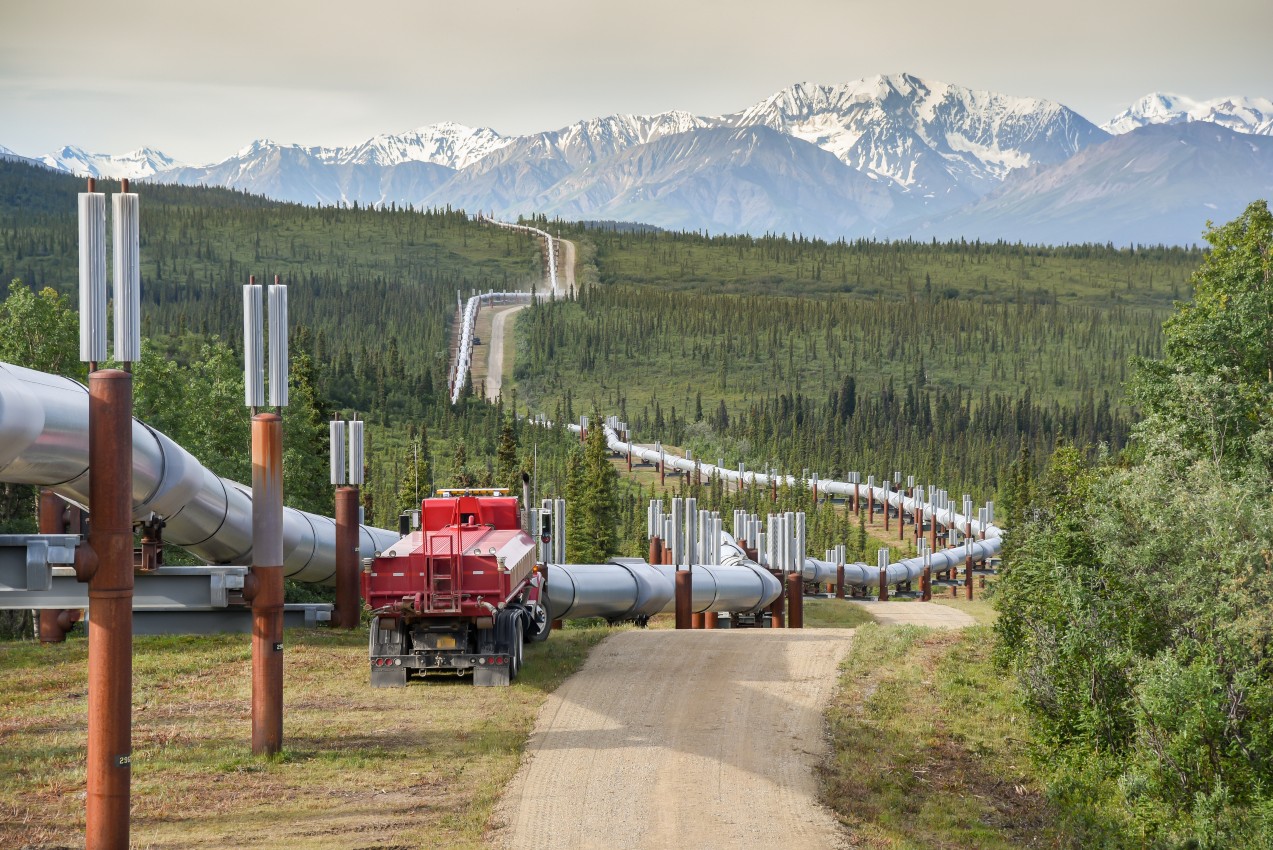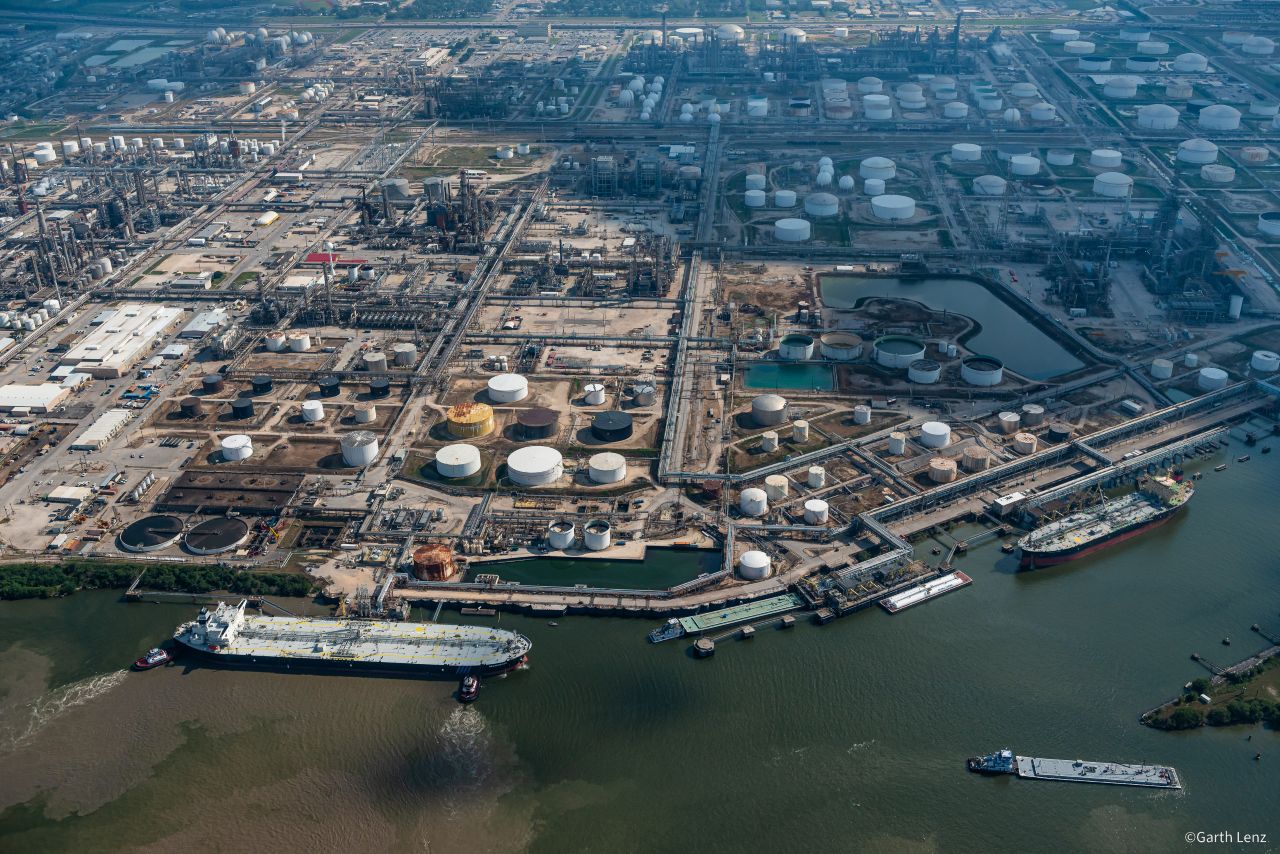Startup of Texas plastics plant by ExxonMobil and Saudi Arabia followed by wave of air and water pollution violations

GREGORY, Texas – Nearly two years after one of the largest plastics plants ever built in the U.S. began operations in this Gulf Coast town, some residents here say they have seen none of the promised benefits from the plant, which is jointly owned by ExxonMobil and the Saudi Arabian government.
However, neighbors have seen the Gulf Coast Growth Ventures plant consume vast amounts of water in a drought-stricken region, suck up a half billion dollars in local tax breaks, and commit 63 air and water pollution violations, according to state records.
“The residents aren’t getting anything,” local resident Genoveva Garcia Labeaga said in an interview at a local Dairy Queen where she was meeting with other local women to discuss concerns about the industrial development.
The plant looms north of Corpus Christi, on the outskirts of Portland, in the tiny town of Gregory, which has a population of 1,740 that is 90 percent Latino. Taking up 1,350 acres, the plant looks like a small city plunked down in the middle of cotton fields and wind farms, its lights clearly visible from all over town at night. Sometimes, the plant’s flares also fill the night sky with an orange glow.
The facility takes ethane from natural gas and, via a process called steam cracking, transforms it into up to 1.8 million metric tons per year of ethylene, one of the building blocks of plastics. It also produces up to 1.3 million metric tons per year of polyethylene and 1.1 million metric tons per year of monoethylene glycol, two other plastics building blocks. These products end up being used in packaging, construction materials, clothing and automotive coolants, among other products, according to ExxonMobil.
The plant is one of 36 similar ethane “cracker” plants around the country meant to convert natural gas into raw ingredients for plastics, according to records compiled in the Oil & Gas Watch database. The rise in U.S. plastics manufacturing is driven by abundant and relatively cheap natural gas, a result of the boom in hydraulic fracturing that has also made the U.S. one of the world’s top natural gas exporters. In addition to these 36 plants, two ethane cracker projects are under construction, and 12 have been announced or are in some phase of the permitting process.
Spurred by promises of jobs and the opportunity to increase their tax base over decades, local governments often offer massive tax giveaways to the companies building these plants, some of them the world’s largest and wealthiest energy corporations.
In March 2017, the Gregory-Portland Independent School District approved $249 million in property tax breaks for the facility over a 10-year period from 2022 through 2032. San Patricio County government approved a separate package of tax incentives worth another $210 million over seven years.
The tax incentives benefit ExxonMobil, the world’s largest non-government-owned energy company that in 2022 made $55.7 billion in profits. The other investor in the project, Saudi Arabia’s Basic Industries Corporation, or SABIC, is majority-owned by Saudi Aramco, the country’s state-controlled oil and gas company and arguably the world’s most profitable business.
Encarnacion “Chon” Cerna, a Portland resident and retired chemical engineer, said the school board was “stupid” for giving the tax breaks to such massive companies.
“The independent school district needs to be dedicating the time to educate children and bring up the ratings of our schools instead of dealing in things they don’t understand,” Cerna said. “Who from the kingdom of Saudi Arabia needs tax breaks from Texas?”

The decision to grant the tax break came after fierce debate at local school board meetings that drew hundreds of angry residents. In an email to residents ahead of the school board vote, project leader Robert Tully said the companies “will follow through with our Good Neighbor Commitments on health and safety, quality of life, education and workforce development, and being good environmental stewards,” according to the San Antonio Express-News.
However, residents living within a couple miles of the plant say they have not experienced any of the benefits its boosters promised.
In interviews, members of the group of Gregory women, most of whom have lived there their whole lives, described how the former farming area has declined over the years. The community once had a larger high school than Portland, but the school has closed as resources shifted to Portland, a majority-white city.
If Gregory disappears, “there is no legacy of ‘this is my hometown,’” said resident Carmen Hernandez, who also spoke of the difficulty finding information on air pollution from the facility.
ExxonMobil and its Saudi partners assert on the plastic plant’s website: “Health, safety and environmental protection are core values for Gulf Coast Growth Ventures… Company and regulatory programs will ensure operations are protective of public health, safety and the environment.”
Public records suggest otherwise. The plant released vast amounts of harmful air pollutants during its startup process in late 2021, according to records from the Texas Commission on Environmental Quality. For example, in just one emissions “upset” incident, lasting from Dec. 20, 2021, to Jan. 5, 2022, the plant released 26 different chemicals, including benzene – a known carcinogen – along with butane, propane, and more obscure substances like methylcyclopentadiene or cyclopentene.
According to state records, between the plant’s first startup processes in December 2021 and April 2023, the plant has experienced 10 unpermitted (meaning illegal) emission incidents that released 560,802 pounds of air pollutants. These included equipment failures, emergency flaring, and unplanned shutdowns. One of these incidents, between Aug. 30 and Sept. 1, 2022, sent over 280,000 pounds of harmful chemicals into the air, including 97,000 pounds of nitrogen oxides, which contribute to smog and acid rain. News reports state that emergency flares at the facility burned for two days and could be seen from 20 miles away.
The plant has also racked up 63 environmental violations in less than two years, according to TCEQ records. These include failure to comply with limits for pollutants such as nitrogen oxide and carbon monoxide, failure to properly sample and analyze discharges of stormwater from the site, and failing to properly operate and monitor its flares.
For some residents, the plant’s construction was the first step in efforts to transform the small towns north of Corpus Christi, once mostly known for their fishing opportunities, into industrial hubs. The heavy industrial growth in also led the City of Corpus Christi, the regional water supplier, to commit vast volumes of drinking water in its supplies to fuel industrial growth.
Errol Summerlin, co-founder of local group Coastal Alliance to Protect our Environment, said the plant “woke us up to the disaster that was coming.”
After the opening of the Exxon-Saudi plant and a rolled-steel factory recently built by the company Steel Dynamics, up to 80 percent of Corpus Christi’s water has now been committed to heavy industry, city officials have said. The plastics plant is permitted to use up to 25 million gallons per day at peak production, with another 6 million gallons per day for the steel plant. That commitment essentially burned through all the excess water in Corpus Christi’s regional supplies, leaving no cushion for severe droughts, such as the one gripping most of Texas now.
“Exxon has caused us to be in this pickle where we don’t have water for drought now,” Summerlin said. “They knew it at the time, and they did it anyway.”
Even more frustrating for residents is that the biggest industrial users are not subject to drought restrictions. Oil, gas, and manufacturing companies that consume at least 100,000 gallons per day can pay 25 cents per 1,000 to exempt themselves from all but the most severe drought cutbacks, according to city code. Meanwhile, residents can face fines of at least $500 per day for using their sprinklers more than once per week.
The lack of fresh water has spurred a race to build expensive desalination plants to tap into the seawater of Nueces Bay. Residents would pay more on their water bills to subsidize these plants, which would also discharge their highly salty brine water into the Nueces Bay, potentially raising water temperature and harming sea life.
Even construction of the plastics plant proved to be disruptive. At a loading terminal near Portland, the builders unloaded enormous production units, pre-assembled in China, that were tall enough to loom over the surrounding homes. The huge modules were trucked at less than 2 miles per hour along a 4-mile road through Portland to the plant site, causing a headache for some local residents.
Opposition to Gulf Coast Growth Ventures is what originally spawned Summerlin’s group, Coastal Alliance to Protect Our Environment, which is now involved in fights over industrial sites in Corpus Christi and other communities surrounding Nueces Bay.
“Exxon did succeed in getting in under the wire before we really had some real muscle,” Summerlin said. However, the opposition network is now more active and has racked up some successes, including helping to push away another massive plastics plant called Project Falcon that was put on hold in 2020.
But Summerlin said the region is still being “pummeled” with new facilities, including the expansion of a Cheniere liquefied natural gas (LNG) plant, new projects to make hydrogen from natural gas, and the desalination plants that would supply water to industry.
“There are all kinds of battles going on on both sides of the bay now,” Summerlin said.















